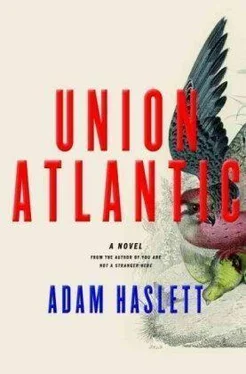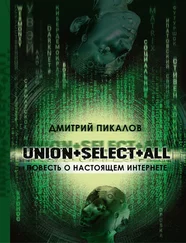Downstairs, he passed through the mansion’s empty rooms and, finding the touch-screen keypad by the front door inscrutable, pushed an Off button and saw the screen announce: Fanning Disarmed.
Mikey was good. He was very good.
As he came down the front steps, the late-winter sun was just beginning to strike the side of his garage. Glancing over the roof of his car, he saw a woman in a blue ski jacket coming out the back door of the old house up the hill, which was apparently inhabited after all. Tall and rather thin, she had longish gray hair and a stiff, upright posture. With her were two large dogs, a Doberman and some sort of mastiff. It looked as if the animals were too strong for her, that she might be pulled down by them, but a yank of her arm brought them under control and they led her in orderly fashion along the stone path to the overgrown driveway. At first Doug thought she hadn’t noticed him at such a distance. But then, as he was about to get in his car, she glanced in his direction, and Doug waved.
She made no response, as if surveying an empty landscape.
Rude or half blind, he couldn’t tell. Driving slowly, he turned onto Winthrop Street and, lowering the passenger-side window, rolled up beside her.
“Good morning. My name’s Doug Fanning. The new place here — it’s mine.”
For a moment, it seemed she hadn’t heard a word he said and was perhaps deaf to boot. But then, abruptly, as if the car had only now appeared, she came to a halt. Bringing the dogs to heel, she leaned down to look into the car. The deeply lined skin of her face had the same weathered gray hue as the side of her house. Without a word, as if he weren’t even there, she sniffed at the air of the car’s interior; the Lexus he’d leased for the new commute was still pine fresh.
“Trees,” she said. “Before you came. All of it. Trees.”
And with that she stood upright again and kept walking.
For months now Charlotte Graves had tried to avoid looking at the new place. And yet how could anyone’s eyes not snare on the enormity of it? It had been designed to draw attention.
As she and the dogs came down the drive the following morning, it came into view once again: a hulking, white mass of a building, three full stories in the middle, with wings on either side and someone’s idea of an orangery or sunroom protruding from the far end. A cupola the size of a small bandstand stood atop the pile, betwixt two fat, brick chimneys. A columned portico framed the enormous front door. Either side of this, along the front of the house, were yew shrubs set in beds of newly delivered wood chips. It looked, more than anything else, like a recently opened country club, and indeed the landscaping of the yard, with its empty flower beds cut from the imported turf like oval incisions on a piece of bright-green construction paper and its perfectly crosscut lawn running to the river’s edge without so much as a transitional weed, reminded one of the manicure of a golf course. In line at the drugstore, Charlotte had overheard a real estate agent describing it as a Greek Revival château.
This was what had replaced the woods that Charlotte’s grandfather had given to the town for preservation. This steroidal offense.
Over the last year, as it was being built, she had often reminded herself that the house was merely the furthest and most galling advance of the much larger intrusion, the one that had begun decades ago, first at a distance, a sighting here or there, a fancy stroller in the library stacks, a concern for caloric totals voiced over the meat counter. More recently had come the giant cars, the ones that looked as if they should have gun turrets mounted on their roofs, manned by the children glaring from the backseat. For years the news had made so much of bombings in the Middle East, and of course in dear old New York now as well, and of the birds of prey we released in retaliation but they never mentioned the eyes of the wealthy young and the violence simmering numbly there. She had seen it at school, the way her students had grown pointed, turned into swords wielded by their masters. As soon as she began speaking of such things openly the principal had gone to the retirement board and they had got rid of her. Nearly forty years of teaching history to the children of this town and they had hustled her out for speaking the truth.
With the Bennetts on one side of her and the woods on the other, Charlotte had always thought she would be safe from the worst of the intrusion. Her house, the old family place, was a redoubt of sorts. After all this time living in it, its memories were for her neither a comfort nor a haunting. They were simply the traces of beings with whom she shared the place. Time by herself had done that to Charlotte, slowly worn away the hard barrier of the self that had clenched against loneliness for so many years at the beginning but in the end lacked a source of power. Unfed by the barriers of others, social fear tended to wither. The membrane between herself and the world had begun to breathe. And while this gentle dissipation had put to rest the anxiety she’d endured in the earlier years, when still wed to the story of marriage, it had increasingly opened her to a more profound, if not exactly personal, terror. Say, for instance, not the thought but the unsought intuition of every soul at stake on the planet hour to hour. A thing not to be borne for more than a minute without destroying the integrity of her individual mind. So you let in just a few fates at a time, hoping the blinders would hold. With the dogs, she could just about manage. How comforting it turned out even their ornery presence could be when the dumb quantity of humanity pressed its case.
Before the mansion had been erected, there had been the chain-saws and backhoes, trees dragged like corpses to the road. Then the engines of the diggers, the cement mixers, the nail guns. She had stayed indoors, unable to watch. They removed so much earth, the angle of the land itself had changed. The maples they left along the top of the hill, from where she could now see all the way down to the river, did a poor job of hiding the new site even with the leaves out, and as fall had come round again the naked wood frame of the unfinished house had shown clearly through the bare branches.
As a teacher all these years, seeing for herself the small-mindedness of those who ran the town of Finden, Charlotte should have known it would come, that the town would betray the trust her grandfather had placed in it. Her father might have done something about it. A man with a bedrock faith in the law, he had prosecuted malfeasance to the last. Episcopalian by birth, Presbyterian by temperament, Quaker in abstention, secular to the bone. He would have found a way to stop these cretins. But not her younger brother, Henry. No. After a few brief discussions with the lawyer, Cott Jr., Henry had suggested that if Charlotte found it too much to bear, perhaps the time had come to sell the house and move somewhere, as he put it, more practical.
Thus it had been left to her to wage the battle. Naïvely, she had begun with an attempt to persuade, writing letters to the selectmen and the newspaper. When that produced nothing but a few polite replies, she’d begun gathering signatures outside the supermarket, informing people of the town’s plans. Just a few years earlier, most people would have at least stopped and said hello. She had been their teacher, after all, or their children’s teacher, or both. But now they looked upon her with pity.
Budgets were budgets, the town said. They regretted deeply the necessity of putting a parcel of land up for auction. But the referendum for school funding had failed at the polls and they had to look to their assets. Never mind the breach of faith. Never mind the lobotomized, negligent short-termism of it all, as if a one-time windfall could ever fund an annual expenditure. What had government become these days but the poorly advertised fire sale of the public interest?
Читать дальше












